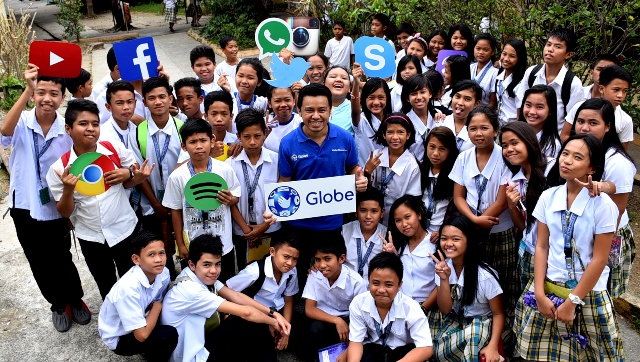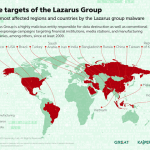Students of Dasmarinas East National High School learn about cyber wellness at the launch of the Digital Thumbprint program. Together with them is Globe Corporate Social Responsibility Manager Rofil Sheldon Magto.
Globe Telecom has joined forces with Optus and Singtel in launching Digital Thumbprint, an award winning program that teaches the youth to understand the impact of their online behavior and how to be safe and responsible for their online activities. The local campaign forms part of the digital nation roadmap created by Globe to promote intelligent and judicious use of the Internet towards a #WonderfulPH.
Patterned after the Optus Digital Thumbprint in-school program where it has already reached 81,000 high school students across Australia, Globe also aims to educate as many Filipino youth on the importance of responsible digital citizenship.
Andrew Buay, Singtel Group VP for Corporate Social Responsibility, said: “The Singtel Group leads digital citizenship and cyber wellness programs across Asia. As a Group, we implement educational programs, leverage our technology and provide resources and apps as well as partner with leading community organisations to create empowered and responsible digital citizens.”
“As we help build the Philippines into a digital nation, we need to educate, at the same time, protect our youth on the impact of technology in their lives. We are happy to have Optus and Singtel with us in this project,” said Yoly Crisanto, Globe Chief Sustainability Officer and SVP for Corporate Communications. “Alongside our Global Filipino Schools Program, we endeavor to bring not just online connectivity to public schools but hope to make K8-12 students become more responsible digital users through our cyber wellness campaign,” she added.
With 46% of Filipinos using the Internet daily at an average of 5.2 hours, and over 40% of Filipinos now having access to data-capable phones, Globe sees it as an opportune time to advocate responsible use of the information highway and protect its customers, especially the youth, against threats online which can have real negative impact.
“The Philippines is considered fourth in the world in reported instances of cyber bullying. This highlights digital citizenship as a major social need for young people in Philippine society. To improve the wellbeing of young Filipinos, Globe wants to adapt the successful and best-in-class Digital Thumbprint model of Optus for the local context,” said Bong Esguerra, Director for Globe Corporate Social Responsibility.
In Australia, the Optus Digital Thumbprint program was co-designed with the Karrikins Group and has been warmly received by the participants, with 98% and 96% of teachers and students, respectively, agreeing that the program is relevant and engaging. Due to its success, the program won the ‘Security and Online Safety” category at the 2015 Australia and New Zealand (ANZIA) Internet awards and has been a finalist in both the ACCOMS Community Contribution Telco Industry Awards and the Melbourne Community Awards. In addition, it has been recognized and accredited by the Australian Government’s e-safety Commissioner’s Office.
The Digital Thumbprint program offers three workshops for high school students – Digital Insight, which provides activities for students to help discern proper online behavior; Digital Impact, which tackles issues on technology’s impact on students’ social activities; and Digital Ambition, which equips students with skills on how to use technology to help them achieve life goals.
For the local workshops, they will be anchored on the key learning themes of safety and security, responsibility and etiquette, and empowerment and leadership. “We are confident that through these workshops, we can replicate the success of the Optus Digital Thumbprint program in Australia and be an enabler of cyber wellness and responsible digital citizenship in the Philippines,” Esguerra said.
Research conducted by the Karrikins Group for the Philippines shows that there are very few significant programs focused on digital education (technology skills) and those that do exist are heavily focused on commercial activities.
For instance, data from Digital Marketing Philippines shows that as of January 2015, there were 40 million active Philippine social media accounts with 32 million users accessing social media using mobile devices.
On the other hand, while Internet connectivity in Philippine schools is mandated, the availability of technology in the learning environment is low. In fact, out of the 46,739 public schools nationwide, only 12,121 or 25.9% are connected to the internet.
Globe has been trying to help address the situation by making strides in the field of digital education. Its Global Filipino Schools (GFS) Program, for example, is a long-term educational initiative that seeks to transform select public schools into centers of ICT excellence and bring 21st century learning closer to more teachers and students.
There are currently 20 Global Filipino Schools around the country with an additional 60 more to be launched this year with the aim of having one facility in each of the 226 divisions of the Department of Education (DepEd). The Digital Thumbprint program for the Philippines will initially be rolled-out in the said schools but will be expanded to other ICT-enabled campuses nationwide. All high schools interested in the program may send their inquiry to bridgecom@globe.com.ph.












